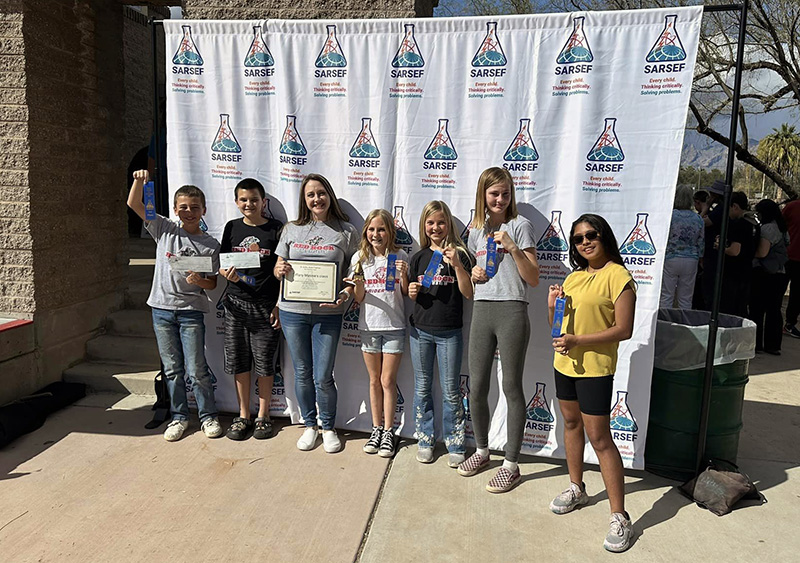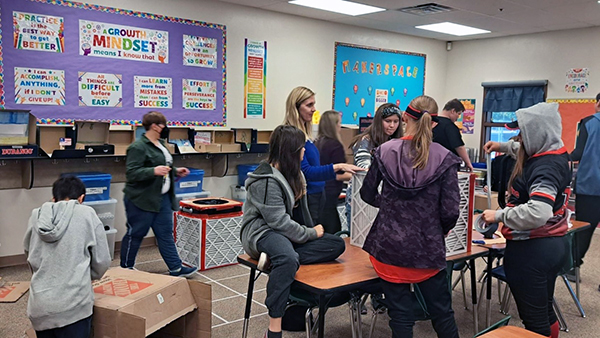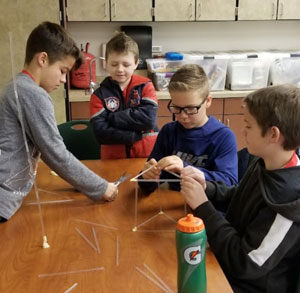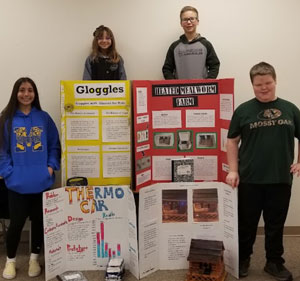Gifted and Talented Education (GATE)
Welcome to Red Rock School District’s Gifted and Talented Program!
First Place Award for Grade 7 SARSEF Human Health and Behavior

Projects
Our GATE students were recognized and featured for their Corsi-Rosenthal Box Project in the Arizona State University (ASU) News, announcing the publication of the 2023 research in an academic journal!
- News Article: New research: DIY air filters work better than commercial HEPA filters for fraction of cost
- Academic Article Summary
Congratulations to our GATE student researchers and Ms. Massie!

Mission Statement

Gifted children are so much more than their intellect or talent. It is our mission to address all needs (Cognitive, social, emotional, physical, psychological, and more) by nurturing the whole gifted child. In our mission, we aim to:
- Employ appropriate identification protocols and programming models that cultivate potential in order to identify more gifted students.
- Provide access to challenging learning opportunities for all students, so that emerging talents may be recognized and developed.
- Commit to accurate identification of both talent and disability domains for twice-exceptional students; adopt a strengths-based, talent-focused approach in and out of the classroom.
- Educate teachers and parents on strategies for supporting the socio-emotional development of gifted students.
- Develop a range of varied gifted education services to address the diverse and changing needs of students with gifts and talents.
Our Vision

At Red Rock School, we have a vision to help children develop their intellectual and academic potential. To discover student potential and support gifted children as they reach for their personal best, we employ a variety of special strategies in our specialized GATE pull-out program. This program fosters higher-level thinking, allows for greater student expression, considers individual student strengths and weaknesses, and provides a variety of learning experiences to challenge students.
For more information regarding the layout of our program, please visit the GATE Program Layout section below.
Arizona Revised Statute §15-779 defines a gifted child as "Any child of lawful school age who displays superior intellect, advanced learning ability or both and who needs special instruction and services to reach appropriate levels of achievement."
According to the National Association for Gifted Children, students with gifts and talents perform–or have the capability to perform–at higher levels compared to others of the same age, experience, and environment in one or more domains. They require modifications to their educational experiences to learn and realize their potential. Students with gifts and talents:
- Come from all racial, ethnic, and cultural populations, as well as all economic strata.
- Require sufficient access to appropriate learning opportunities to realize their potential.
- Can have learning and processing disorders that require specialized intervention and accommodation.
- Need support and guidance to develop socially and emotionally as well as in their areas of talent.
- Require varied services based on their changing needs.
For more information defining giftedness, please see the National Association for Gifted Children's Definition of Giftedness PDF.
No gifted individual is exactly the same; however, there are some traits that gifted individuals have in common. The following list of traits may help parents and educators to better identify whether or not a child should be referred for gifted testing. Some basic identifying characteristics for referral of gifted testing may include:
- Unusual alertness
- Rapid learner; puts thoughts together quickly
- Excellent memory
- Unusually large vocabulary and complex sentence structures for age
- Advanced comprehension of word nuances, metaphors, and abstract ideas
- Enjoys solving problems, especially with numbers and puzzles
- Often self-taught reading and writing skills as a preschooler
- Deep, intense feelings and reactions
- Highly sensitive
- Thinking is abstract, complex, logical, and insightful
- Idealism and has a sense of justice at an early age
- Concern with social and political issues and injustices
- Longer attention span and intense concentration
- Preoccupied with own thoughts—daydreamer
- Learn basic skills quickly and with little practice
- Asks probing questions
- Wide range of interests (or extreme focus in one area)
- Highly developed curiosity
- Interest in experimenting and doing things differently
- Puts ideas together that are not typical
- Keen and/or unusual sense of humor
- Desire to organize people/things through games or complex schemas
- Vivid imaginations (and imaginary playmates when in preschool
For a checklist of gifted characteristics for underrepresented populations, please visit the Arizona Department of Education's Project Bright Horizon Checklist for Underrepresented Populations.
For characteristics and behaviors of culturally, linguistically, and socioeconomically diverse gifted learners, please visit the Project Bright Horizon Checklist for Culturally, Linguistically, and Socioeconomically Diverse Gifted Learners.
Before referring a child for gifted testing, please note that there are many misconceptions in regards to what a gifted learner looks like. The chart below may help one to differentiate between high achievers, creative thinkers, and gifted learners when contemplating a gifted testing referral.
| A High Achiever... | A Gifted Learner... | A Creative Thinker... |
|---|---|---|
| Remembers the answers | Poses unforeseen questions | Sees exceptions |
| Is interested | Is curious | Wonders |
| Is attentive | Is selectively mentally engaged | Daydreams; may seem off task |
| Generates advanced ideas | Generates complex, abstract ideas | Overflows with ideas, many of which will never be developed |
| Works hard to achieve | Knows without working hard | Plays with ideas and concepts |
| Answers questions in detail | Ponders with depth and multiple perspectives | Injects new possibilities |
| Performs at the top of the group | Is beyond the group | Is in own group |
| Responds with interest and opinions | Exhibits feelings and opinions from multiple perspectives | Shares bizarre, sometimes conflicting opinions |
| Learns with ease | Already knows | Questions: what if... |
| Needs six to eight repetitions to master | Needs one to three repetitions to master | Questions the need for mastery |
| Enjoys the company of age peers | Prefers the company of intellectual peers | Prefers the company of creative peers but often works alone |
| Understands complex, abstract humor | Creates complex, abstract humor | Relishes wild, off-the-wall humor |
| Grasps the meaning | Infers and connects concepts | Makes mental leaps: Aha! |
| Completes assignments on time | Initiates projects and extensions of assignments | Initiates more projects that will never be completed |
| Is receptive | Is intense | Is independent and unconventional |
| Is accurate and complete | Is original and continually developing | Is original and continually developing |
| Enjoys school often | Enjoys self-directed learning | Enjoys creating |
| Absorbs information | Manipulates information | Improvises |
| Is a technician with expertise in a field | Is an expert who abstracts beyond the field | Is an inventor and idea generator |
| Memorizes well | Guesses and infers well | Creates and brainstorms well |
| Is highly alert and observant | Anticipates and relates observations | Is intuitive |
| Is pleased with own learning | Is self-critical | Is never finished with possibilities |
| Gets A's | May not be motivated by grades | May not be motivated by grades |
| Is able | Is intellectual | Is idiosyncratic |
Some students who are gifted may also have a disability or mental health diagnosis in one or more domains. The term “Twice-exceptional,” also referred to as “2E,” is used to describe gifted children who have the characteristics of gifted students with the potential for high achievement but also give evidence of one or more disabilities as defined by federal or state eligibility criteria. These disabilities may include specific learning disabilities (SpLD), speech and language disorders, emotional/behavioral disorders, physical disabilities, autism spectrum, or other impairments such as attention deficit hyperactivity disorder (ADHD). Accurate identification of both giftedness as well as disability domains are crucial to guide appropriate psychological and educational planning.
Gifted identification is a critical component of an effective gifted education program. A ‘Gifted’ label is a diagnostic one that provides useful information about how an individual child learns (acquires, processes, and applies information) to inform curricular and instructional decisions. Identification is a critical component of effective gifted education programming.
Referral Process
Referrals for gifted testing can be made by a parent, educator, or high scores on standardized testing. In order for a child to be evaluated for giftedness using the Cognitive Abilities Test, administered through Red Rock Elementary school district, a Gifted Evaluation Parent Consent Form must be completed and returned prior to the testing dates for the school year. Please see the Gifted Testing Dates section below for testing dates.
Arizona Revised Statute §15-779.02 states that schools must provide for routine screening for gifted pupils using one or more tests adopted by the state board as prescribed in section 15-203, subsection A, paragraph 15, and section 15-779.01. School districts may identify any number of pupils as gifted but shall identify as gifted at least those pupils who score at or above the ninety-seventh percentile, based on national norms, on a test adopted by the state board of education.
For a list of the state board of education’s recognized and approved tests, please visit the Arizona State Board Approved Test List.
Red Rock School District’s Approved and Site Administered Test:
Red Rock School District uses the Cognitive Abilities Test (CogAT) to identify students eligible for gifted education through Red Rock's GATE program. A student may only test once in a twelve-month period. Testing is offered in the fall, winter, and spring. All second-grade students are offered and encouraged to participate in gifted testing during the spring testing window.
For more information regarding gifted testing at Red Rock School, please see the Gifted Testing Dates section below.
Cognitive Abilities Test (CogAT)
The CogAT measures abilities across the symbol system that are most highly correlated with fluid reasoning, problem-solving, and success in school. It consists of three main test batteries, each with three subtests. The three subtest scores are combined to make an overall score in the following areas:
- Verbal (Assesses vocabulary, efficiency, and verbal memory)
- Quantitative (Evaluates abstract reasoning)
- Nonverbal (Assesses spatial and figural content)
With its separate measures of Verbal, Quantitative, and Nonverbal reasoning, this research-based and proven test provides multiple perspectives on student ability.
Gifted students are eligible by scoring in the 97th percentile or above in any or all of the following batteries. This means that a student scored in the top 3% of their same-age peers.
Prior Eligibility Through Previous School District
Students who have already been identified as gifted through a previous school district, using a state-approved test, will automatically be accepted into Red Rock’s GATE program upon the receipt of transcripts identifying him/her as gifted by his/her prior school district.
Gifted services must be provided to students who score at the 97th percentile or above on the verbal, quantitative, or spatial sub-test of a state-approved test.
Students with gifts and talents have needs along a continuum as well as in a diverse range of domains, both cognitive and affective. Needs also differ among gifted students within domains based on their readiness for more advanced content. The services that students receive should reflect a match between both their current achievement levels or potential and instruction that addresses their immediate and future needs. The goal of services is to alleviate needs that would otherwise go unmet. Because students’ needs and educational environments change over time, gifted education services must change as well. To meet all needs of our gifted students, we have employed a specialized pull-out program focused on acceleration, flexible ability grouping, and social-emotional support.
Acceleration
Educational acceleration is one of the cornerstones of exemplary gifted education practices, with more research supporting this intervention than any other in the literature on gifted individuals. The practice of educational acceleration has long been used to match high-level students’ general abilities and specific talents with optimal learning opportunities.
At Red Rock Elementary School, we can accelerate students using Mesa Distance Learning Program (MDLP). MDLP is a sponsored program that offers an online learning experience for students in grades six to eight. High-quality, interactive online courses are taught by appropriately-certified teachers and allow for concurrent or full-time enrollment. A multimedia-rich curriculum that aligns to Arizona State Standards and is accredited by AdvancED helps students achieve their educational goals. The proprietary learning management system includes numerous progress monitoring tools for parents and students. MDLP brings online learning to a higher standard of education for students and families.
Flexible Ability Grouping
The practice of grouping, or placing students with similar abilities and/or performance together for instruction, has been shown to positively impact student learning gains. Grouping gifted children together allows for more appropriate, rapid, and advanced instruction, which matches the rapidly developing skills and capabilities of gifted students.
Red Rock School District employs a unique flexible ability grouping model. In addition to meeting student needs according to grade level (horizontal grouping), Red Rock also meets the needs of students based upon their qualifying gifted area within multiple grade levels (vertical grouping).
In addition to our specialized GATE pull-out program, identified gifted students are provided enrichment activities in their area of strength, which are delivered by the general education classroom. Gifted & talented teachers collaborate with the general education teacher to identify, discuss, and determine a student's individual enrichment needs. On-going communication and collaboration help address any change in the student's enrichment needs.
Socio-emotional Support
Socio-emotional development may lag intellectual development. Thus, it is crucial that gifted education professionals and parents of students with gifts and talents promote well-rounded development and the pursuit of self-actualization. Further, qualities such as emotion regulation, social skills, willingness to take strategic risks, ability to cope with challenges and handle criticism, confidence, self-perceptions, and motivation should be developed, as they may differentiate those individuals who move to increasingly higher levels of talent development from those who do not. These qualities should be further differentiated based on the domain of talent and the stage of talent development.
In addition to acceleration programming, vertical and horizontal ability grouping, Red Rock School District also has built-in time blocks to meet the socio-emotional needs of our gifted students with fluid grouping combinations.
Arizona Revised Statute §15-779.02 states that schools must provide for routine screening for gifted pupils using one or more tests adopted by the state board as prescribed in section 15-203, subsection A, paragraph 15 and section 15-779.01.
Red Rock School District administers cognitive abilities testing, according to grade level, on the following dates:
- Fall Testing Window: September 3–6, 2024
- Winter Testing Window: January 13–17, 2025
- Spring Testing Window: May 5–9, 2025
Top 10 Myths in Gifted Education
- This video explores the ten most common myths surrounding gifted children.
- TED-Ed is TED’s youth and education initiative. TED-Ed’s mission is to spark and celebrate the ideas of students around the world.
- Gifted guru’s youth portal is a website full of resources for gifted youth.
- SARSEF is a local organization dedicated to promoting critical thinking and problem solving through science and engineering.
- This is a collection of hands-on science explorations.
- Mensa for kids has a collection of information and activities.
Hoagie's Gifted Education Page
- Hoagies gifted is full of resources, articles, books and links to help and support gifted children.
- Solve video-based logic puzzles.
- Learn to play chess through different puzzles and by playing against a computer opponent.
- Use your spatial skills to build different shapes.
- Solve various problems and dilemmas within a science fiction-based future.
- Use your logic skills to solve these number puzzles. Daily Sudoku offers printable puzzles in different formats.
- Exercise your verbal creativity and logic to build words in this card game.
- Use your logic skills to find sets in this puzzle card game.
- Scratch teaches students to code. Coding can help develop creative thinking, critical thinking, and reasoning skills.
- Tetris promotes visual-spatial reasoning, as well as the decision-making pace is increased.
- Prodigy unlocks game-based learning with quantitative and verbal skills.
- Spellie promotes critical thinking in word-based form.
- This site allows students to virtually use various manipulatives that are common in the classroom.
- Provides thought-provoking puzzles that promote multiple perspectives and mathematical reasoning.
- A large collection of an assortment of 3-Act Math Tasks for all grade levels.
- Math Tasks that promote thoughtful mathematical justification.
- Math Games, Logic Puzzles, and “Brain Workouts.
- A collection of challenging math task video challenges.
- This site allows for individuals to create a digital book which can include text, images, video, sound, music, and more!
National Association for Gifted Children
- The National Association for gifted children is a website that strives to enhance the growth and development of gifted and talented children through education, advocacy, community building, and research.
- Arizona Gifted is an organization to advocate for the diverse population of gifted and talented students in the state of Arizona.
- SENG is a network of people who guide and support the emotional needs of gifted, talented, and twice-exceptional individuals.
Hoagies' Gifted Education Page
- Hoagies gifted is full of resources, articles, books, and links to help and support parents, teachers, and gifted children alike.
- The Gifted Child Society is a website where parents can find helpful information and learn about seminars and workshops they can attend.
Exquisite Minds: Creative and Gifted Children
- Exquisite Minds is a website where parents and teachers who work with gifted children can find resources, online games, tips, tools, and more on this social site.
- Gifted Guru is a website full of resources, ideas, and tips for educators & parents of the gifted.
- TED-Ed provides everything you need to spark and celebrate your child’s ideas.
- 2E Newsletter is a website full of articles and resources of interest for parents of twice-exceptional children.
National Inventors Hall of Fame Camp Invention
- Invent is a STEM summer camp program for grades K-6 that turns curious kids into innovative thinkers
- The Gifted Collective is a resource in North Phoenix for all things gifted. They provide resources, workshops, programming options, external links, and a business directory for enrichment.
- Meet the Gifted Collective in North Phoenix - Video

